Today, music isn’t just food for the soul, it’s good for business. That’s what we can learn from Soundtrack Your Brand.
Music influences human behavior. And business is about influence — influencing shoppers to buy from you.
Humans inherently respond to sounds and people are emotionally attached to what they hear and like.
This love for music has birthed billion-dollar streaming platforms and an industry that’s expected to hit $76.9 billion by 2027. Music streaming isn’t new for consumer audiences — Deezer, Spotify, Boomplay, and Apple Music — but Soundtrack Your Brand has taken music streaming to the B2B space.
Ola Sars found out that good music is good for business. And he’s articulated the business need for music like Spotify did for individual users. He even partnered with Spotify to get started.
Soundtrack Your Brand has shown that music drives bottom-line results. Brands that incorporate music into their brand identity connect with their audiences better and can be remembered for longer.
However, finding the perfect music for your brand can be a daunting task. It’s beyond mere compilation. It requires being intentional because bad music can have a negative impact on your business.
In this interview, Ola Sars shares his insights on finding the perfect music for your brand.
How Soundtrack Your Brand works
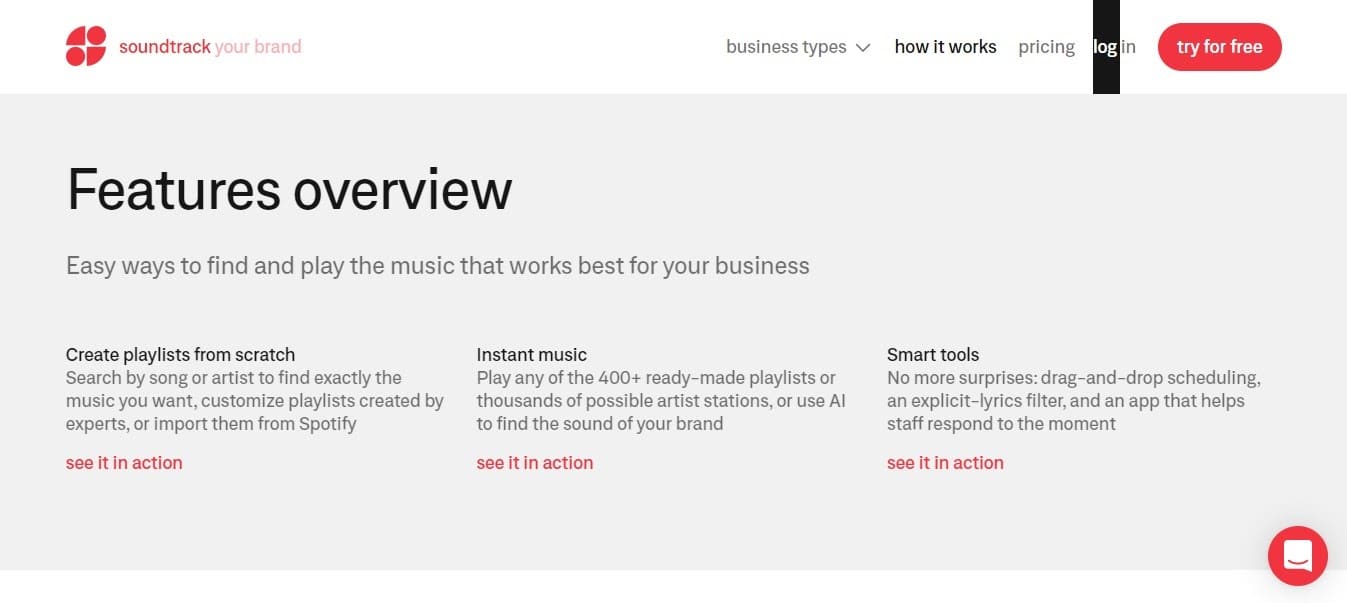
With amazing features and cutting-edge technologies, Soundtrack Your Brand allows its users to set the right tone for the customer experience.
With Soundtrack Your Brand, You can:
- Create playlists from scratch and customize playlists created by experts, or import them from Spotify.
- Use AI to find the sound of your brand.
- Drag-and-drop scheduling and an app that helps staff respond to the moment.
- Organize your brand around a music genre or theme.
- Help staff respond to the moment and engage with customers.
- Manage everything from anywhere
Key Takeaways from the Interview
This interview explains the nexus between music and branding. Ola Sars dives deeper to share a case study and other useful information on how good music can impact ROI.
Here are some key points to note:
- Ola Sars founded Soundtrack Your Brand in collaboration with Spotify to bring music streaming to B2B.
- Soundtrack Your Brand started as a result of consumers’ demand.
- It primarily serves the small business market and the medium-sized market.
- Businesses can use music in a very personalized way to deliver the brand experience to their customers.
- Music is a cost-effective tool to augment, develop, and improve the customer experience for small businesses.
- Brands can use artificial intelligence to input any type of brand sound they choose.
- Soundtrack Your Brand tested its concept in Northern Europe and Sweden, Finland, and Norway.
- Spotify Business became Soundtrack Your Brand.
- With QSR Chain, Soundtrack Your Brand proves a 9% increase in top-line revenue when applying the right music.
- Playing the wrong music directly affects business growth.
- Soundtrack Your Brand is now in 74 markets with 40,000 businesses buying its service.
- As long as you figured out what your brand is all about, Soundtrack Your Brand has the tools to help you create the soundtrack of your brand.
My Conversation with Ola Sars
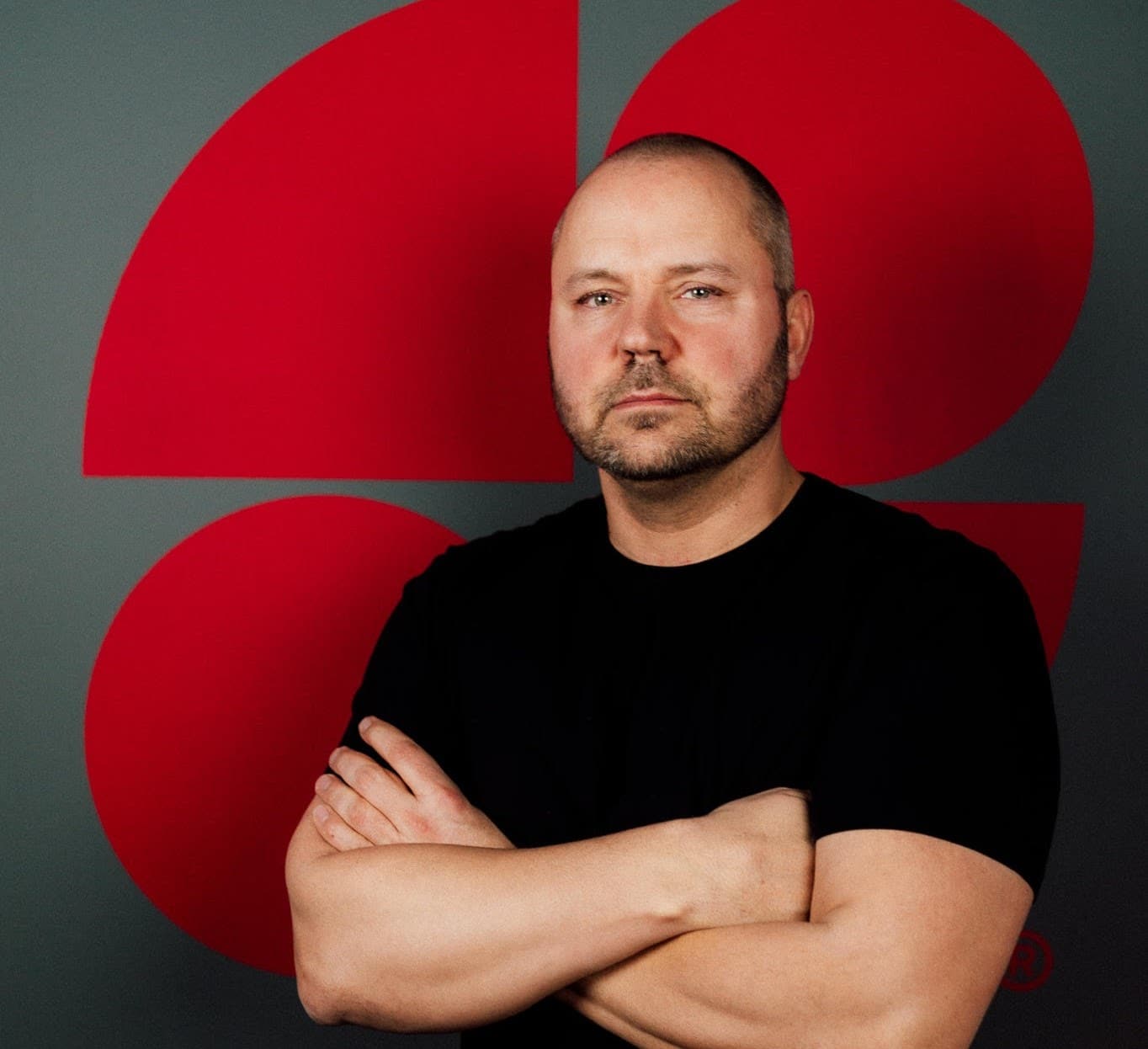
1. Hello, please introduce yourself and tell us about what you do
Okay. My name is Ola Sars. I’m the CEO, Founder, and Chairman of Soundtrack Your Brand.
Soundtrack Your Brand is the company I founded together with Spotify. The ambition was to take music streaming into the business-to-business market. Meaning music and shops, restaurants, cafes, and any type of public domain.
Soundtrack Your brand is my fourth startup in the music space. I’ve been doing this for a while. I’ve been building companies, selling companies, buying companies in the music streaming space during the last 10 years.
Previously, I was one of the co-founders of Beats music that got acquired by Apple and became Apple music. I’m somewhat of an experienced entrepreneur in the music streaming space.
2. Why did you choose the music business? Why did you choose that specifically?
Music is my passion. I’ve always been obsessed with music and music has always played a huge role in my life. Ten years ago, I decided to change my career and follow my passion to work within the music industry.
I had the opportunity to do it, and the timing was perfect because the music market was changing right in front of us into something very interesting and different. And It was a good time to get into the music industry at that time.
3. Okay. What do you intend to do with soundtrack Your Brand that you probably didn’t do with these other businesses? What’s unique about this one?
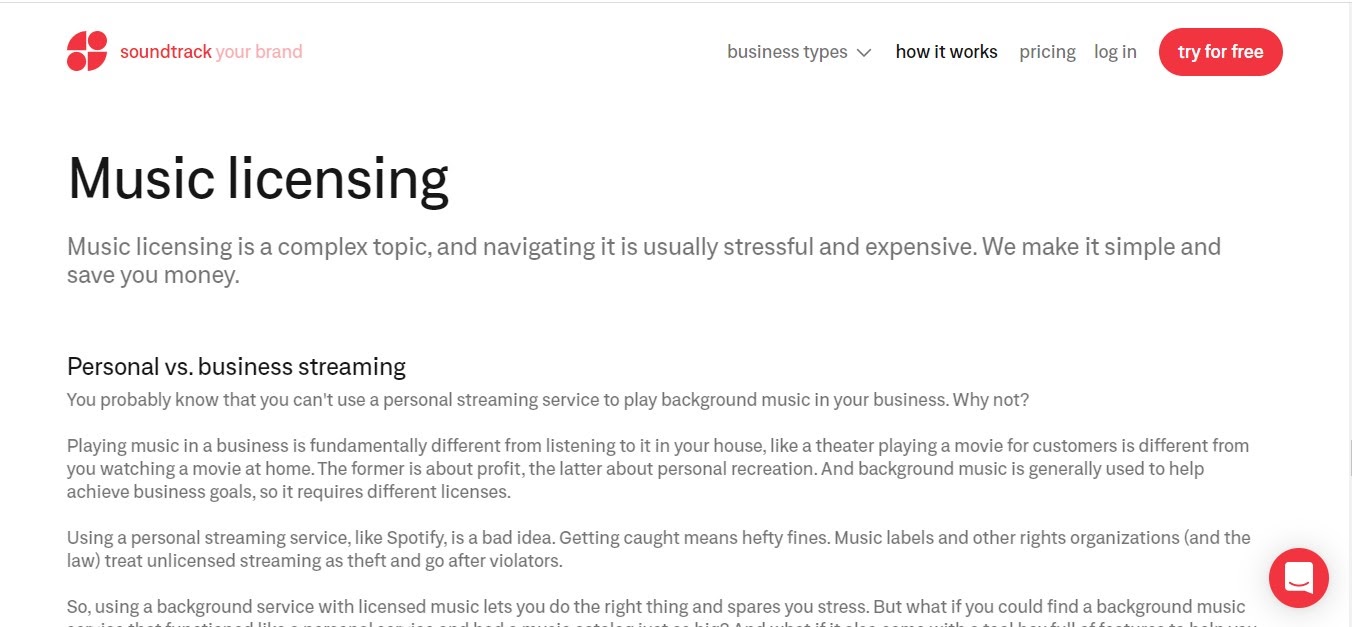
This one is unique because it’s actually my first business-to-business startup. It’s a music startup, but it targets the business customers of the world. Meaning that my customers now are, for example, Adidas or McDonald’s, or Starbucks of the world.
I’m now selling business-to-business. Previously, it was business-to-consumer, selling to all the consumers of the world.
So, it’s a huge difference in the type of company that I’m building. It’s huge in the type of customers that I’m serving. But it provides a very interesting opportunity to the music industry.
As such actually adding all of the businesses and the world into the music market. And that provides an extra opportunity that provides a new market for the music industry in general. I’m kind of paving the way for that.
4. Yeah! I figured. What’s quite interesting here is I was thinking, how did you come about this? How did you think of taking music to the B2B audience? How did you discover that there was a need there that wasn’t being filled?
Well, I think it dawned on me when I was working in the consumer market. Because when I was working at Beats in the US, I would be working with obviously Jimmy Iovine, Dr. Dre, and all of these big artists, Trent Reznor, Gwen Stefani, and everyone.
But, all the time while I was working in the music industry, we realized that there’s so much interest in music and music culture, even coming from brands.
So, we would have big companies like General Motors, for example, or a big telecommunications company come to us and to ask, how can we relate to music streaming? How can we use music to build our brands?
The idea was basically driven by the potential market from actual brands. I just took that idea and configured it into a business plan. An idea on how to build a company around it.
As such, it was actually brands that came to us on the consumer side and opened the idea in my head. Wow! There must be a huge market here.
Enabling music for brands worldwide. So, the idea was basically driven by the potential market from the actual brands.
I just took that idea and I configured it into a business plan. An idea on how to build a company around it. Obviously building a music streaming company is difficult.
It’s not easy.
It’s very expensive and complicated. But I knew there was a market there.
I could raise significant money directly and build a big team and build the first business product. The idea was actually provided to me by my future market.
5. Interesting! Is this something for just enterprise brands or do you also serve small businesses and maybe Medium-Sized Businesses?
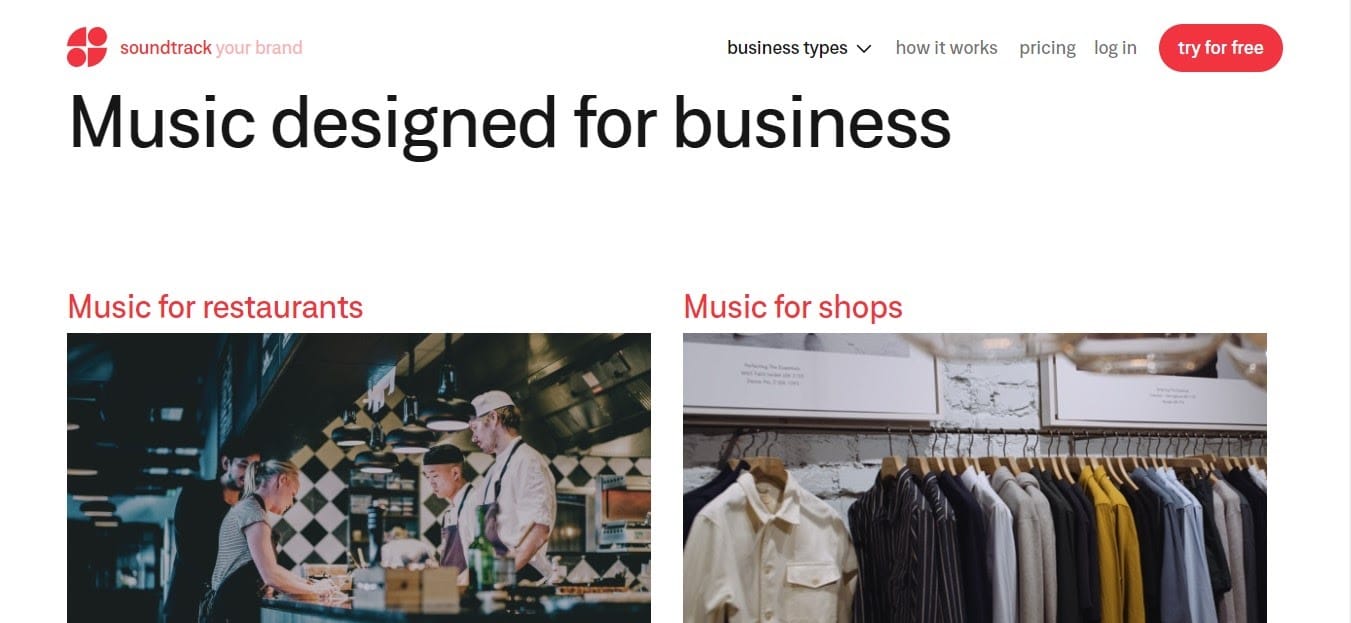
I’m primarily serving the small business market and the medium-sized market. The enterprise brand is just a good example because they are brands that people know of.
But the bigger proportion of my business serves small business owners. Everything from local restaurant entrepreneurs to cafe entrepreneurs to people running small fashion brands and even hotels.
The main market is the small business and the medium-size entrepreneur who really care about their brands and their brand experience.
Hence, they really want to use music in a very personalized way to deliver the brand experience to their customers that they’re inspiring.
So, music for them is a very cost-effective tool to augment, develop, improve their customer experience and their small businesses.
6. The whole idea of branding is to have an emotional connection. Now, it’s easy to see how that goes with music, but I’m thinking about how small businesses leverage music really. I want to believe that not a lot of people really know about this. So, what’s it that you’re seeing that businesses might need to be open to right now?
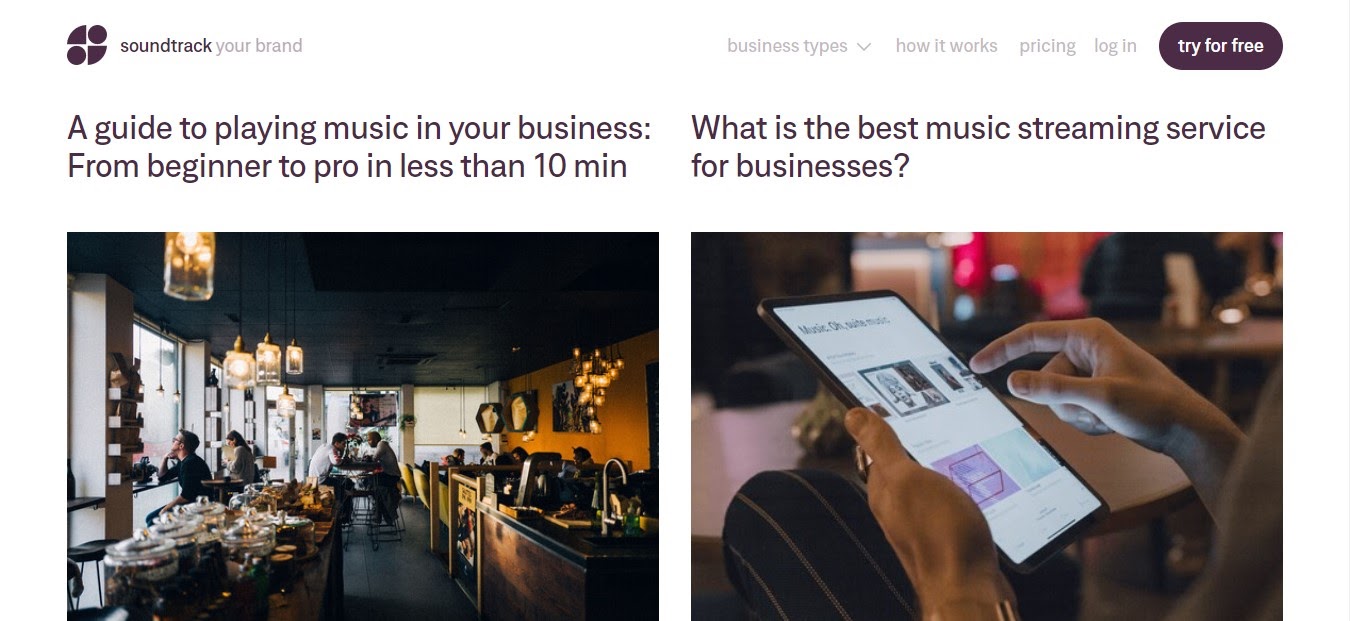
Well, I think, first of all, this has been a very challenging year for small businesses and medium-sized businesses.
Probably, even for big business. But very much so for the small entrepreneurs with COVID19 around the world and the very challenging year.
Overall, I think that has been the core problem for everyone now. Trying to make it through this challenging year. But now we’re seeing the trends going in the right direction, right. We’re seeing business coming back, we’re seeing vaccines coming out.
And I think beyond the summer, we’ll see a new Renaissance. We’ll see the global market open up again for restaurants, with hotels, and so forth.
When that happens, music has always been an integral part and a very important part for experience driven businesses like restaurants, cafes, hotels, retail, and so forth.
We also provide them with various data tools where they can use our artificial intelligence to input what type of brand sound they want to deliver.
And now with the power of music streaming made available for them, they can even further the way they use music to build their brands. They are now provided a platform with over 50 million tracks in 74 markets.
This allows you to engage with our system to create a completely unique musical experience for your brand anywhere, anytime in the world.
We also provide them with various data tools where they can use our artificial intelligence to input what type of brand sound they want to deliver.
They can, for example, tell our machines, our artificial intelligence to play sophisticated low-tempo jazz from the 1950s. And we will provide that brand sound for them.
So, they can use different types of brand-specific inputs in order to create that unique brand sound. And obviously use music to drive their business.
7. Soundtrack Your Brand started as a joint effort with Spotify. How did you secure your partnership with Spotify?
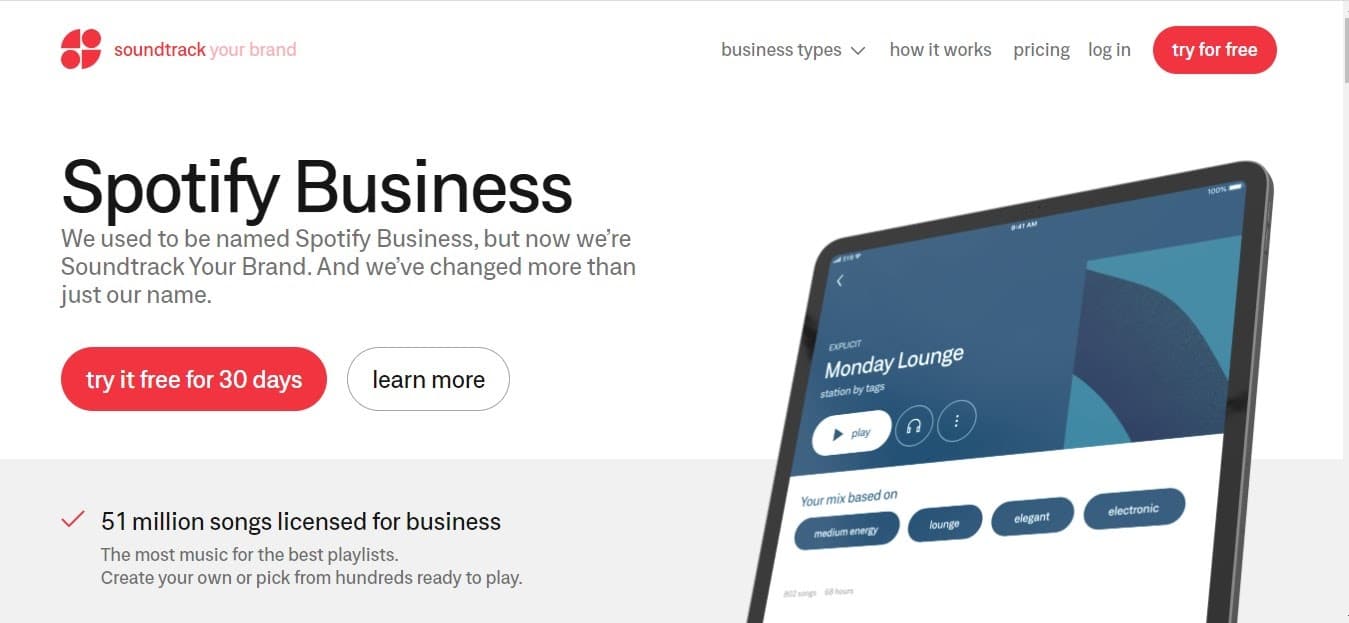
Well! I’m from Sweden but I’ve been working in the global markets for almost all my life. I moved home from the US after my adventure with Beats music.
I knew Daniel and Martin who are the founders of Spotify really well because we’re from the same city. And I’d been their major competitor previously on the Beats side.
Obviously, going after Spotify.
And then we knew each other from the Stockholm tech music and social scene.
When I came home with this idea, I figured that I was going to build the music and audio platform for the business market.
I needed a partner that had a sophisticated music backend because that was a good way of partnering on that side.
Then I could focus on building the actual customer interfacing software. And Spotify was a very good partner.
I knew them really well and they have a very good music platform. When I met with Daniel and Martin, I proposed that we should create a joint venture around building Soundtrack Your Brand. The business-to-business music platform.
I needed a partner that had a sophisticated music backend because that was a good way of partnering on that side. Then I could focus on building the actual customer interfacing software. And Spotify was a very good partner.
They agreed to do that. We started together, testing the concept here in Northern Europe and Sweden, Finland, and Norway.
We actually launched a product called Spotify business initially to test the concept on the market. And very quickly we proved the concept.
We saw that this could be a big global potential. Then I made the decision to pivot into a completely independent company, an independent brand, and building from there in 2018. Then, we launched the independent company and brand, Soundtrack Your Brand.
8. Wow! This shows you have built a lot of relationships over time. Would you say there’s a direct correlation between using partnerships to grow businesses? Does partnership improve the success of growing a business more than just building out alone?
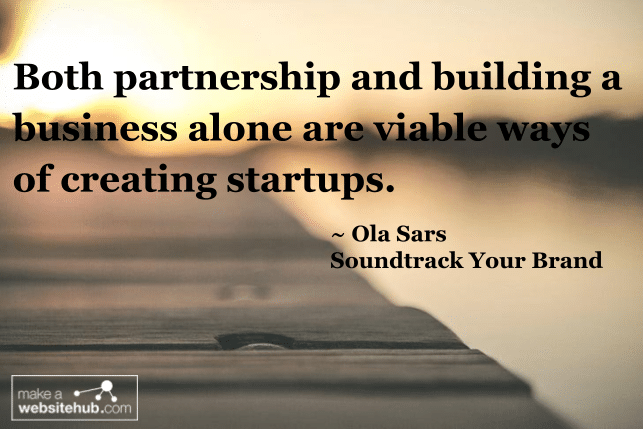
I mean, you could do both. Of course, I think both are viable ways of creating startups or new businesses.
But in the case of Soundtrack Your Brand and building a music streaming platform, it’s extremely sophisticated and expensive to build one.
Using this partnership with Spotify actually saved me years and years of hard work in building various kinds of infrastructure. The backend of the music service and also improved my speed to market.
I could test a concept much quicker with a much smaller initial investment. In this instance, the partnership made a lot of sense.
In other instances, partnerships can be very troublesome. You can start a company with a partner that becomes very dominant. And maybe He doesn’t see it the same way and wants you to do the business.
One way that benefits their costs, when the actual right way of doing the business is not the way that benefits your initial partner.
So, I would say there’s a lot of traps and potential issues with building startups in an industrial partnership structure. I will almost say that doing it as I did through a partnership is very seldom the right way of doing it.
9. I’m just curious. During your testing phase, were you able to show how music would have a direct impact on ROI? I know that in the B2B space, there’s a lot of concern about Return On Investment. Were you able to make that connection? Any cases or data to link the use of music to improved ROI?
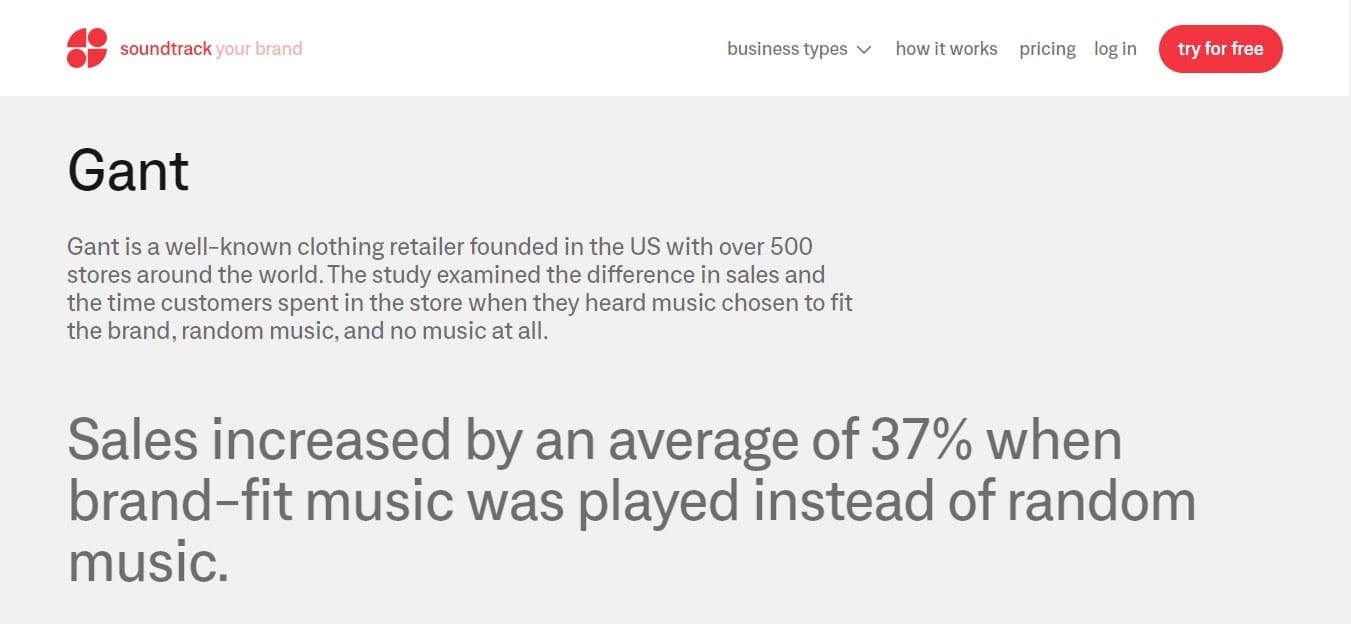
Absolutely! I think you’re absolutely right saying that in B2B it’s all about Return On Investment.
Everything you invest in or buy has to have some type of direct or indirect payback, right?
So in the case of music, you can start with the baseline need, which is, every restaurant, cafe, and hotel needs music. It’s just like, it’s a requirement.
There are no hotels that don’t have music in the reception. And if there are, they’re not doing that well, so they know that they need music.
The second question is, okay, what type of music and, and how do we deploy it? That’s also a very complicated question because there are lots of licensing issues and technology issues and so forth.
With one of the world’s biggest QSR chains, fast food chains, we were actually able to conduct a big field experiment. The world’s biggest field experiment. And proved a 9% increase in top-line revenue when applying the right music.
Just solving by getting music into my reception or into my restaurant is a very complex need. And then after figuring that out, you need to look at, okay, how do I use music to drive my business?
And if I can prove that a sophisticated platform can help me improve my business performance, then I’m willing to pay a premium for that platform.
That’s obviously what we’re going after. We’re providing premium service and the background music space. I mean, previously people have been using CDs or satellite feeds or very clunky kind of radio solutions.
Now we’re empowering them with real-time streaming, data analytics, all the music in the world, and sophisticated artificial intelligence.
To help you play the right music at the right place at the right time.
But, what we also have been able to prove is if you apply our model to music, meaning that you actually input your brand values into our system. You can create a brand sound based on the soundtrack model.
With one of the world’s biggest QSR chains, fast food chains, we were actually able to conduct a big field experiment. The world’s biggest field experiment. And prove a 9% increase in top-line revenue when applying the right music.
Hence, there are statistical methods to directly derive the Return On Investment of actually buying music professionally into your business. Just think about playing the wrong music.
That kind of helps you understand it without being too scientific. Playing the wrong music directly, completely hindered your business. People will leave the shop. Staff will go crazy and you will destroy your business by playing the wrong music.
On the other hand, playing the right music all the way, according to your brand values will drive your business. Will drive your customer spending, your customer retention, and your brand.
10. Yeah! I like the analogy of playing the wrong music. I immediately connected with that. How were you able to get your first client? Was this something that you had to rely on your past successes and things you’ve done in the past and your reputation? How were you able to like prove in the beginning that this was worth it? How were you able to secure the first people essentially?
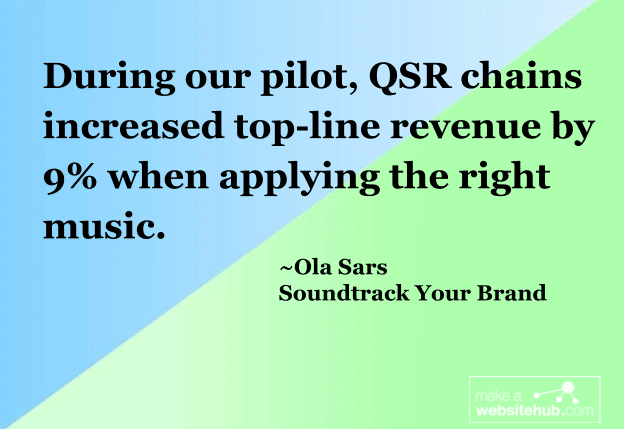
Well! I think it revolves around the structure that I used in building Spotify business initially in three European markets to test out the concept. We were very similar to Spotify in the way we acquired customers. We provided our service online and we provided a business-type solution, which we marketed online.
So, we had customers coming online directly, signing up for Spotify business. Obviously, it helped to carry the Spotify brand initially because it’s a powerful brand, has a great reputation, credibility, and reach.
And, we were able to leverage the Spotify family to start driving our business. Then we started building our sales channels and experimenting with how to sell music to business.
We were able to leverage the Spotify family to start driving our business. Then we started building our sales channels and experimenting with how to sell music to business.
We spent almost two to three years perfecting that model, trying all different types of sales methods when rolling Soundtrack Your Brand out globally.
We are completely an online type of business. We are selling to businesses online primarily, but with some support from humans, meaning customer success.
But, we’ve seen businesses buying very similar to how consumers are buying music today, which is self-service online.
11. As of May 1, 2020, you’d raised $49M in funding, what do you consider before seeking investors? What are you trying to improve on?
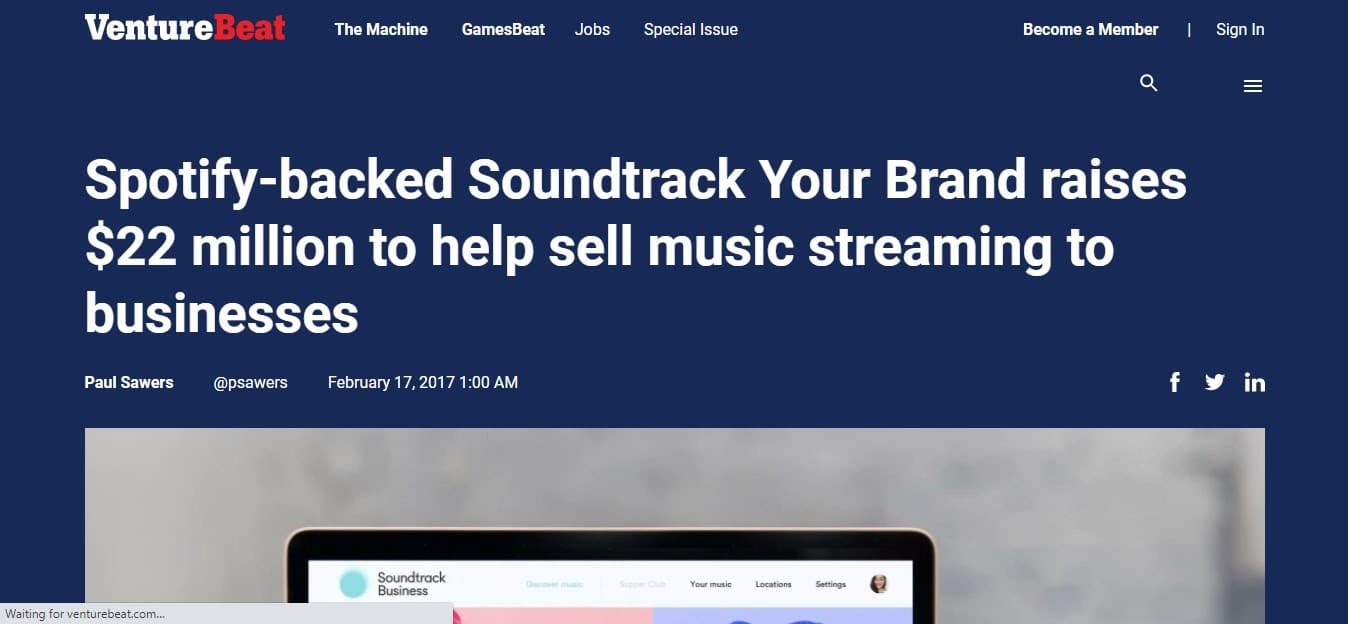
Well, I think the different phases of a company usually start with an idea, a team, funding that idea, and that team to build the first concept or a Minimum Viable Product.
And we did that with the initial investments we had. I put my own money in and Spotify put some money in and then we raised some initial investment.
Then with the initial investment, we were able to bring the first concept to market, a Minimum Viable Product. The second phase a company goes through is the commercial proof of concept. That is we have a product and someone is actually buying it.
It works, it plays music and it’s in a store. Now we need to prove out what the commercial model is. How do we sell it? Does it scale when I invest $10 in the market? Do I get $20 back?
That’s the proof of concept or the commercial proof of concept stage. And we spent almost two years proving out the commercial concept in Norway, Sweden, and Finland.
We raised some money to do that as well from venture capital funds, which was the first, A Round of venture capital funding.
When we had proven out that we took the decision to go global and build our own brand. We raised growth money, meaning let’s take this commercial proof of concept and let’s grow it.
Expand it globally and build up brand independence. So, we raised some more money to do that. That’s the trip of a startup right there.
What the company stands in front of right now is we’re now in 74 markets, we have 40,000 businesses buying our service.
The next stage is what they call scale-up. Meaning can you actually scale this 10 times? Can you pour marketing investments into this concept and actually build it 10, 20, 30 times bigger, fast.
That’s the sequencing and the different stages you go through. If you’re able to be successful, because every one of these stages, probably 99 or 98 of a hundred fallout.
You’re always fighting to get to the next stage with a startup. Trying to make it all the way to where I’m right now as a scale-up, but I’m still not there.
I still need to prove that I can scale this concept globally. I can invest significantly more money into the market in order to grow than just being a small company right now. Hopefully, that turns around, maybe about $15 million.
12. Okay! Interesting. How would you advise a business that probably has never used music in their branding to start? Where should they start from?
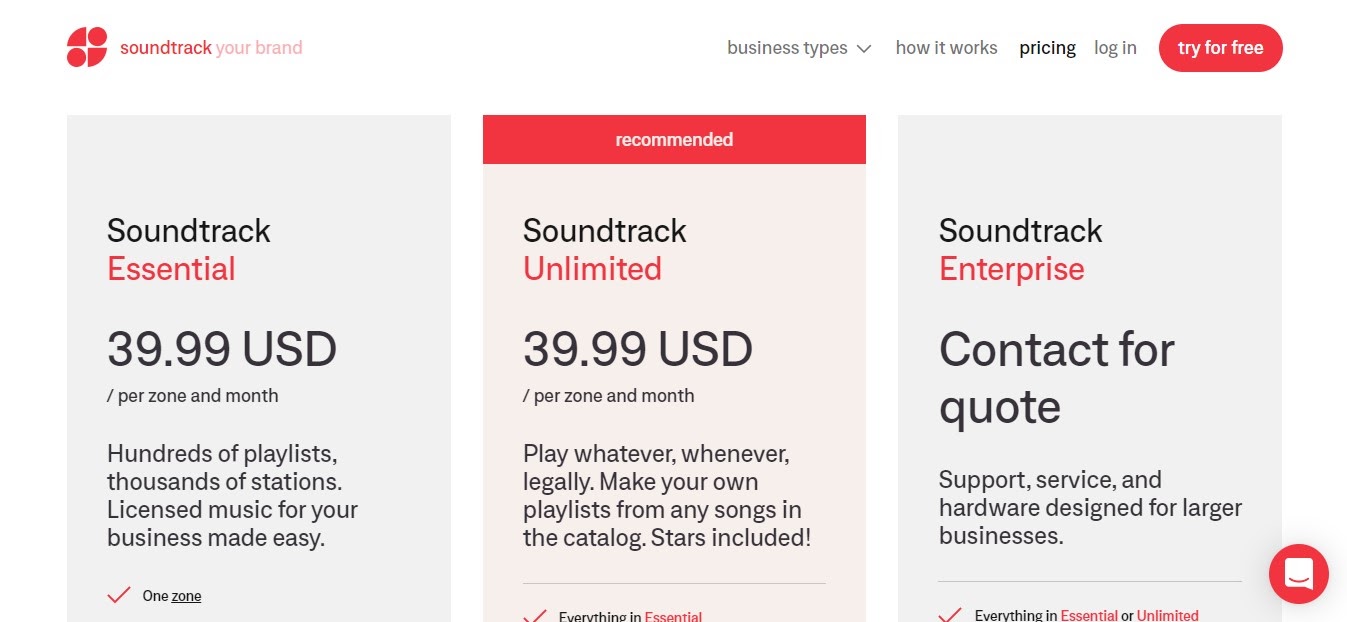
They should start with their entrepreneurial idea. Every entrepreneur has an idea.
- What was the idea from the beginning?
- What do we want to provide to our customers?
- What type of brand do I want to build?
- Who am I?
- What’s my restaurant known for?
- What food am I preparing?
- What feeling do I want to deliver?
Within every entrepreneur’s idea and concept, there is an identity. An aspired identity, and starting to write down that identity.
Usually, entrepreneurs do that because they need to do marketing, or they need to do the design of the restaurant. They need to articulate what their brand is all about.
And once that has been done, that kind of brand statement or brand strategy, or brand positioning needs to be translated into music.
That’s where we come in with our service. You can take your brand positioning and your aspired brand experience, and you can translate that into music on the platform that we provide them.
As long as you figured out what your brand is all about, then we have the tools to help you create the soundtrack of your brand. Then you can deploy that into all of your businesses. If it’s one restaurant, or if it’s a hundred restaurants worldwide, the solution is there to empower you with music.
13. Now unto the last question, which is what the whole world is experiencing right now, the pandemic. I would like to take a positive side to it. What opportunities has the pandemic opened up to you?
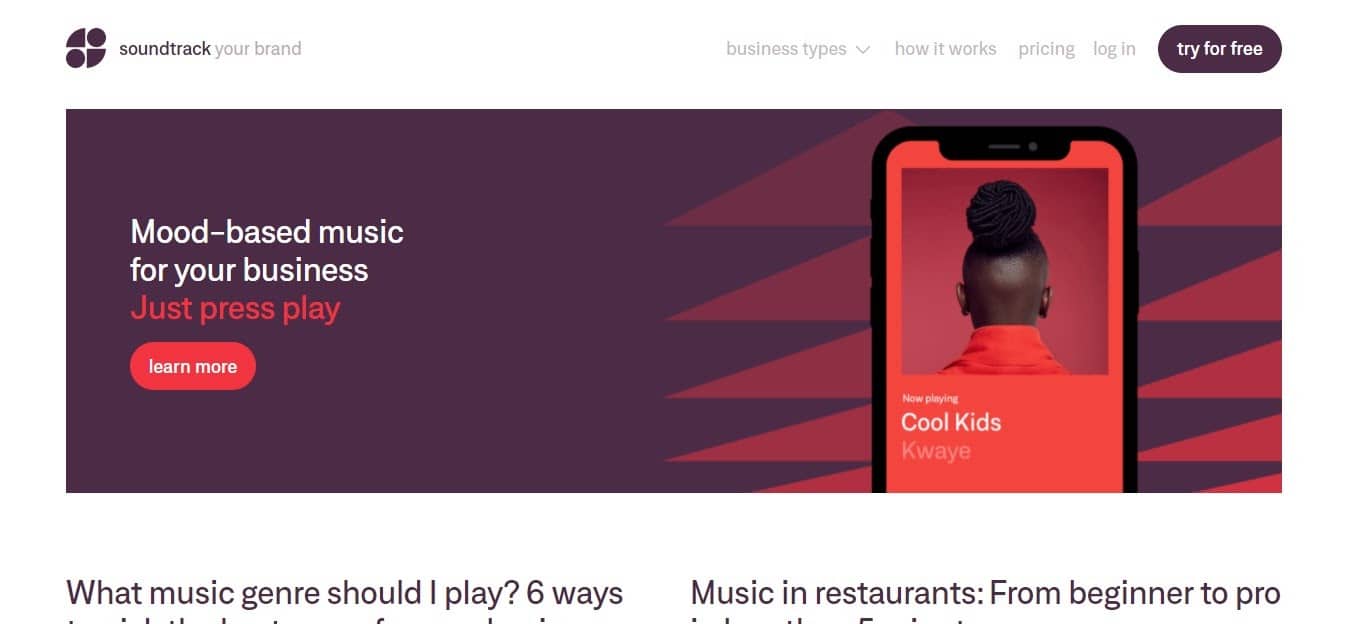
For sure. I mean, it has forced all of us to rethink how to do business and how we can do things differently and better.
For us, it helped us think: okay, brands actually have to also deliver an experience online outside of the actual restaurant experience.
So, we’ve developed our offering to also be able to provide restaurants a way to deliver the brand sound. Maybe through online experiences or through live streaming online and so forth or through their apps.
Not just in the physical restaurant, you can also expand the music experience into online experiences. So for example, now you can take the brand soundtrack with you when you leave the restaurant and listen to it on Spotify, for example.
We’re connecting the dots between digital and physical. COVID has increased our focus on that. But at the end of the day, we have 128 million business locations worldwide that we want to soundtrack.
Our ambition is to soundtrack the world and every physical experience in the world anywhere, anytime. That’s our first mission.
And that is just about to take new speed now coming out of COVID. I think after the summer, we’re going to be very quickly getting back to normal or even more, people are going to be out there dancing, falling in love because we missed so much.
About Ola Sars
Ola Sars is a Stockholm-based serial entrepreneur active in the music-tech space. He is the Founder, CEO & Chairman of Soundtrack Your Brand, the world’s fastest-growing music-platform for B2B.
Before Soundtrack, he co-founded Spotify Businesses together with Spotify, a stand-alone effort to expand Spotify’s reach into B2B-streaming. In 2018, he pivoted Spotify Business into Soundtrack as a fully independent brand and business.
Previous to co-founding Spotify Business, he was the co-founder and COO of Beats Music, acquired by Apple and transformed into Apple Music, as well as the co-founder of Pacemaker, the world’s first DJ-driven music platform.
Ola’s driving force behind his repeated efforts in transforming the music market comes from his conviction that music is undervalued as an art-form and that the music industry offers significant opportunities for value improvement and growth.
Through his multiple start-ups in the music-space, he has focused on unlocking that intrinsic VALUE, both in B2C and now in B2B. Ola has been featured in Rolling Stone, Billboard, Bloomberg and is a regular in music and technology publications.
